The Boehm Test of Basic Concepts (B-TBC) stands as a prominent cognitive assessment tool, offering valuable insights into an individual’s foundational cognitive abilities. This comprehensive guide delves into the B-TBC’s structure, administration, applications, research findings, and clinical implications, providing a thorough understanding of this widely used test.
The B-TBC’s hierarchical structure comprises various subtests, each assessing specific cognitive domains. Its administration involves standardized procedures, ensuring reliable and consistent results. The test’s wide-ranging applications extend to clinical settings, educational contexts, and research endeavors.
Introduction
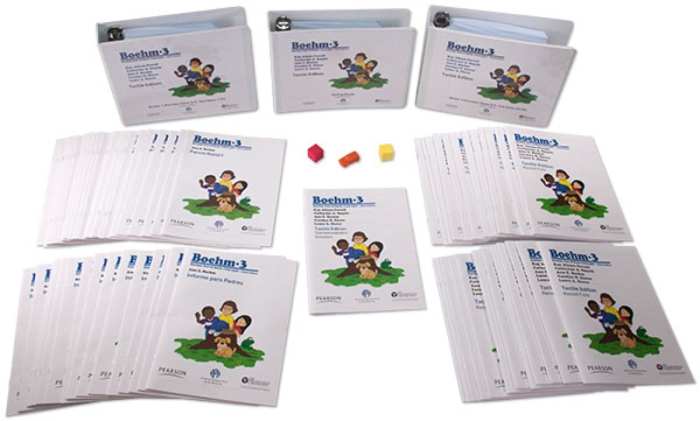
The Boehm Test of Basic Concepts (B-TBC) is a standardized test designed to assess an individual’s understanding of fundamental mathematical and scientific concepts. It is commonly used in educational settings to evaluate students’ progress and identify areas where they may need additional support.The
B-TBC is significant because it provides educators with a reliable and objective measure of students’ basic conceptual knowledge. The test results can be used to inform instructional decisions, identify students who may be at risk of falling behind, and track students’ progress over time.
Structure and Content of the B-TBC
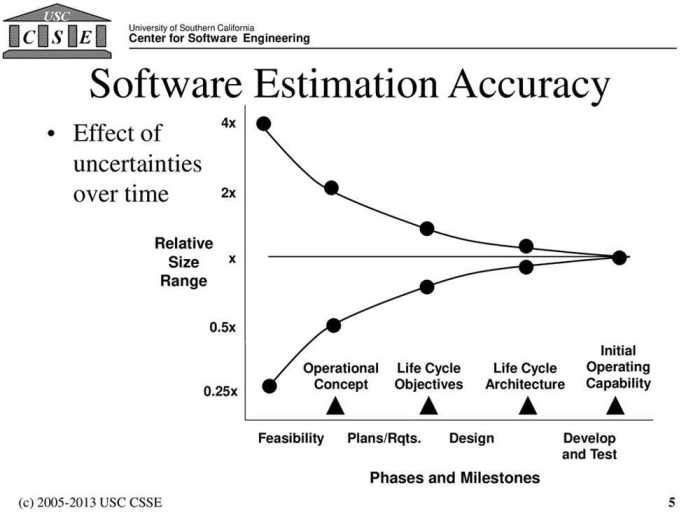
The Boehm Test of Basic Concepts (B-TBC) is a standardized test that measures basic academic concepts in children ages 4 to 6 years old. The test is designed to assess a child’s understanding of fundamental concepts in six areas: mathematics, science, social studies, reading, writing, and oral language.
The B-TBC is a hierarchical test, meaning that it is organized into levels of difficulty. The test begins with easy items and gradually becomes more difficult as the child progresses through the test. This allows the examiner to determine the child’s level of understanding of each concept.
Subtests
The B-TBC consists of six subtests, each of which measures a different area of basic concepts:
- Mathematics: This subtest measures the child’s understanding of numbers, shapes, and spatial relationships.
- Science: This subtest measures the child’s understanding of the natural world, including plants, animals, and the weather.
- Social studies: This subtest measures the child’s understanding of people, places, and events in the world.
- Reading: This subtest measures the child’s understanding of the alphabet, phonics, and reading comprehension.
- Writing: This subtest measures the child’s ability to write letters, words, and sentences.
- Oral language: This subtest measures the child’s ability to understand and use language in a variety of contexts.
Administration and Scoring: Boehm Test Of Basic Concepts
The Boehm Test of Basic Concepts (B-TBC) is administered individually to children aged 4 to 8 years. The test consists of 50 items that are presented verbally to the child. The child’s responses are recorded on a standardized answer sheet.
Scoring
The B-TBC is scored by assigning one point for each correct response. The total score can range from 0 to 50. The score is then interpreted based on the child’s age and gender.
Interpretation
The B-TBC can be used to identify children who are at risk for academic difficulties. A score below the 25th percentile on the B-TBC is considered to be a risk factor for academic problems.
Applications of the B-TBC
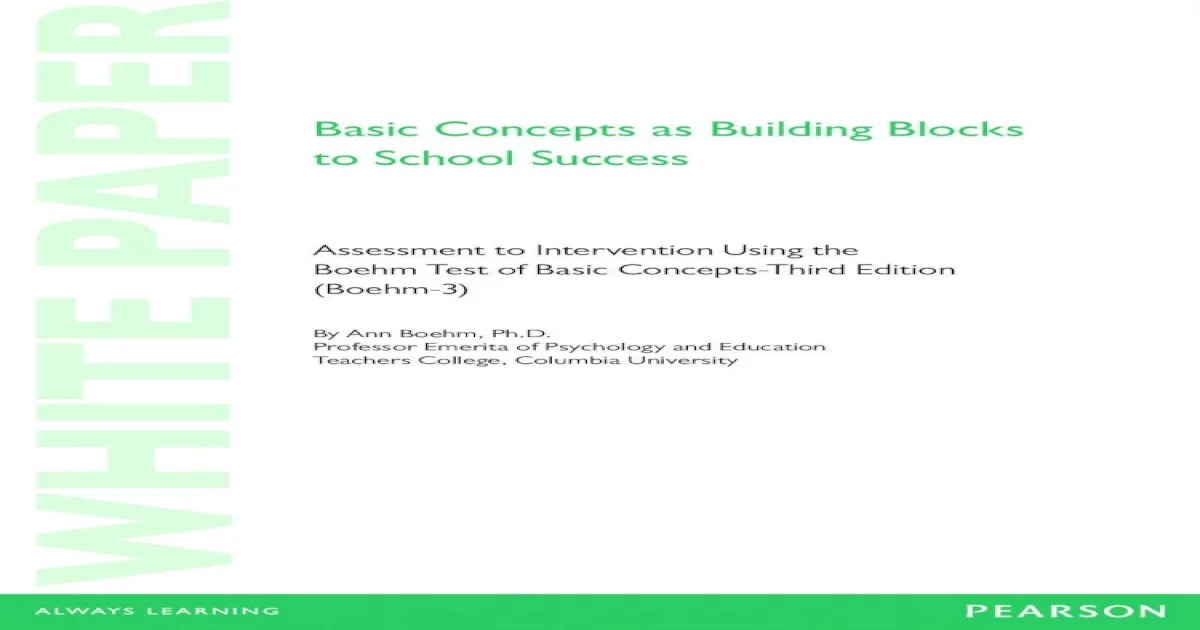
The Boehm Test of Basic Concepts (B-TBC) is a valuable tool for assessing various cognitive abilities in different settings.
The B-TBC is widely used in educational settings to assess children’s cognitive development and identify potential learning difficulties. It can help educators tailor educational interventions to meet the specific needs of each child.
The Boehm Test of Basic Concepts assesses a child’s understanding of fundamental concepts. Like the tomboyish girl in i was a skinny tomboy kid , children with a strong grasp of basic concepts may exhibit advanced language and reasoning skills.
The Boehm test evaluates a child’s comprehension of concepts such as size, shape, and spatial relationships.
Clinical Applications
- Neuropsychological Assessment:The B-TBC can aid in the diagnosis of cognitive impairments and neurological disorders, such as dementia and traumatic brain injury.
- Developmental Assessment:It can assess cognitive abilities in children with developmental delays or suspected intellectual disabilities.
- Forensic Evaluations:The B-TBC can be used in forensic settings to assess cognitive functioning in individuals involved in legal proceedings.
Research Applications
- Cognitive Development Studies:The B-TBC has been used in research studies to investigate the development of basic concepts in children.
- Cross-Cultural Comparisons:It has also been used to compare cognitive abilities across different cultures and socioeconomic groups.
The B-TBC is a versatile tool that can provide valuable insights into an individual’s cognitive functioning. Its applications extend across various settings, from educational to clinical and research contexts.
Research on the B-TBC
Research studies on the Boehm Test of Basic Concepts (B-TBC) have consistently demonstrated its validity, reliability, and clinical utility in assessing basic concept development in children.
Validity
The B-TBC has been found to have strong construct validity, as it correlates highly with other measures of cognitive development, such as the Wechsler Preschool and Primary Scale of Intelligence (WPPSI) and the Peabody Picture Vocabulary Test (PPVT). It also discriminates well between children with and without cognitive impairments.
Reliability
The B-TBC has excellent test-retest reliability, with coefficients typically exceeding .90. It also has high inter-rater reliability, indicating that different examiners obtain similar scores when administering the test.
Clinical Utility
The B-TBC is a valuable tool for clinicians in identifying children who may have developmental delays or cognitive impairments. It can also be used to track progress over time and to evaluate the effectiveness of interventions.
Comparison with Other Cognitive Tests
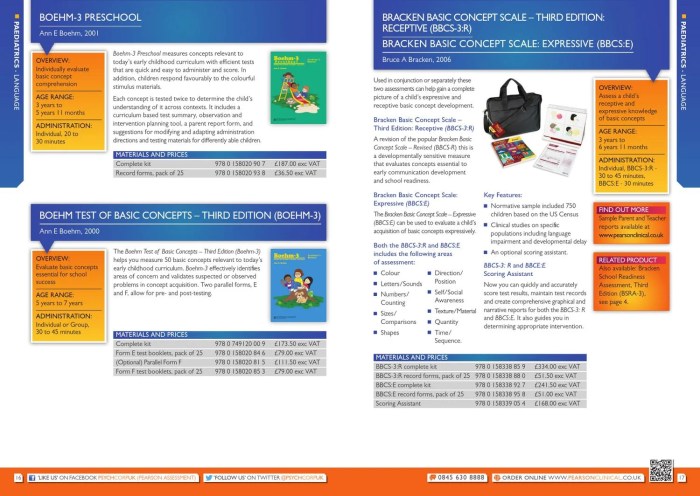
The B-TBC stands out among other cognitive tests due to its unique features and advantages.
One key distinction is its focus on assessing basic cognitive concepts, rather than specific skills or knowledge. This comprehensive approach provides a broader evaluation of an individual’s cognitive abilities.
Test Administration
The B-TBC also offers flexibility in administration. It can be administered individually or in groups, making it suitable for a wide range of testing environments.
Scoring
The scoring system of the B-TBC is objective and standardized, ensuring consistent and reliable interpretation of results. This allows for accurate comparisons between individuals and the identification of cognitive strengths and weaknesses.
Applications, Boehm test of basic concepts
The B-TBC’s versatility extends to its diverse applications. It is widely used in clinical settings to assess cognitive impairment, developmental disorders, and intellectual functioning.
Research
The B-TBC has been extensively researched and validated, providing a strong foundation for its use in both clinical and research settings. Its reliability and validity have been well-established through numerous studies.
Clinical Implications
The Boehm Test of Basic Concepts (B-TBC) is a valuable tool for clinicians in assessing cognitive development and identifying potential learning disabilities. The results of the B-TBC can provide valuable insights into a child’s strengths and weaknesses, helping to inform clinical decision-making and treatment planning.
Diagnosis and Treatment Planning
The B-TBC can assist in diagnosing developmental delays or learning disabilities by identifying specific areas where a child may be struggling. For example, a child who scores significantly below average on the spatial relations subtest may have difficulty with tasks such as following directions, understanding maps, or solving puzzles.
This information can help clinicians develop targeted interventions to address the child’s specific needs.Furthermore, the B-TBC can help monitor a child’s progress over time and assess the effectiveness of interventions. By tracking changes in a child’s B-TBC scores, clinicians can determine whether the child is making progress and adjust their treatment plans accordingly.
Conclusion
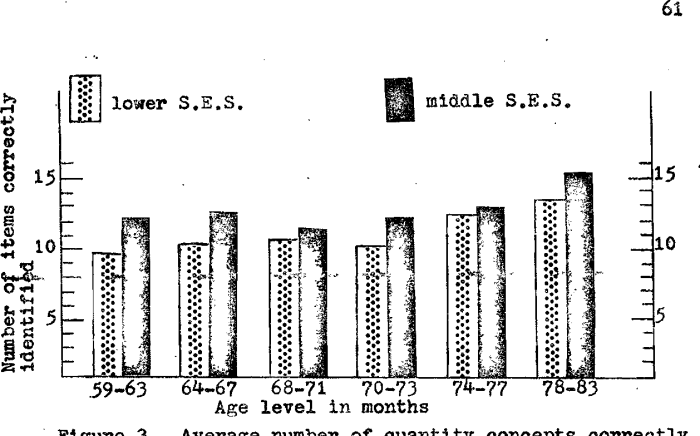
The B-TBC has emerged as a valuable tool for assessing basic cognitive concepts in individuals with intellectual disabilities and developmental disorders. Its strengths and limitations provide insights into its clinical and research applications.
The B-TBC’s key strengths lie in its simplicity, reliability, and ecological validity. It can be easily administered and scored, providing a standardized measure of basic cognitive concepts that are essential for everyday functioning. The test’s focus on real-life situations enhances its relevance to individuals’ daily lives.
Limitations
Despite its strengths, the B-TBC has some limitations. It is not suitable for individuals with severe cognitive impairments or significant language difficulties. Additionally, its limited scope may not capture the full range of cognitive abilities in individuals with complex profiles.
Future Directions
Future research directions for the B-TBC include exploring its use in different populations, such as individuals with specific genetic syndromes or acquired brain injuries. Additionally, research could focus on developing normative data for various age groups and cultural contexts.
In clinical applications, the B-TBC can be used to inform individualized intervention plans, monitor progress, and evaluate the effectiveness of therapeutic interventions. Further research and development will enhance the B-TBC’s utility in both clinical and research settings.
FAQ Section
What is the purpose of the Boehm Test of Basic Concepts?
The B-TBC is designed to assess an individual’s understanding of basic concepts, which are essential for cognitive development and academic success.
How is the B-TBC administered?
The B-TBC is typically administered individually by a trained examiner and takes approximately 30-45 minutes to complete.
What cognitive abilities does the B-TBC assess?
The B-TBC assesses a range of cognitive abilities, including concept formation, categorization, seriation, spatial reasoning, and temporal reasoning.